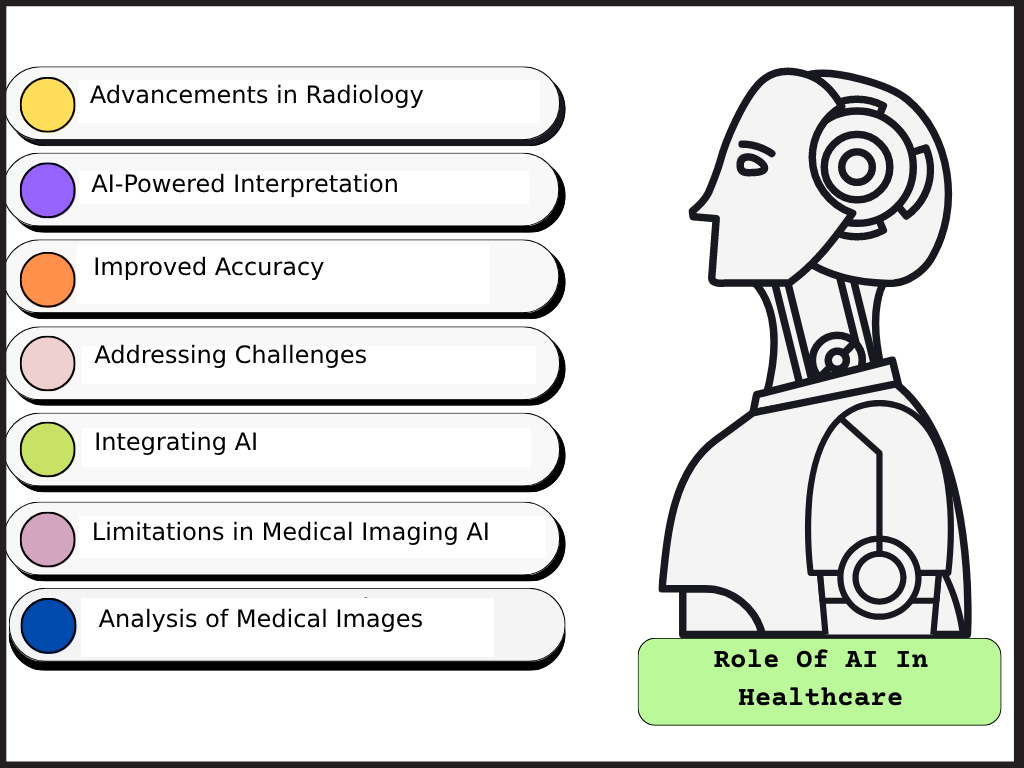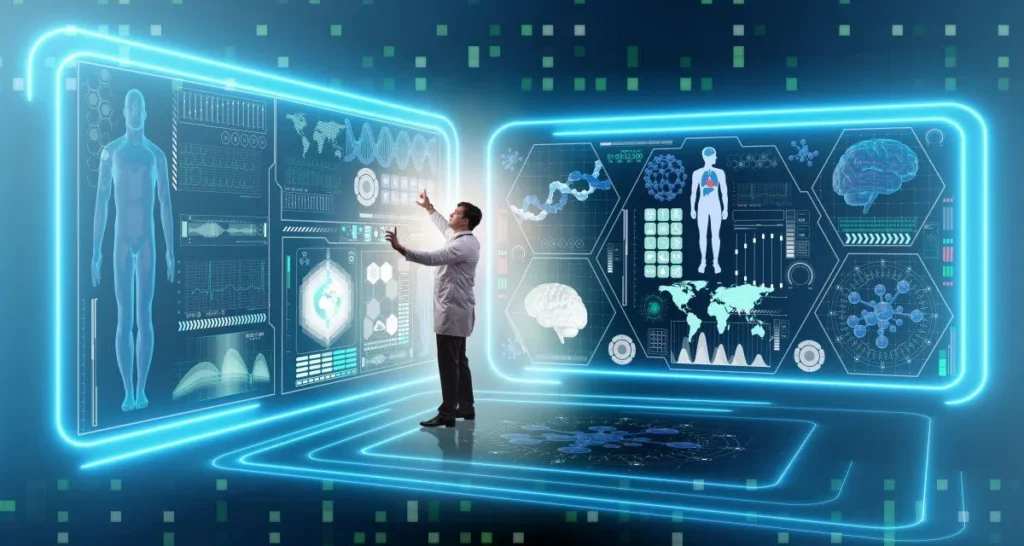In recent years, artificial intelligence (AI) has emerged as a powerful tool for transforming the healthcare industry. AI Healthcare is improving patient care by streamlining administrative tasks. The integration of AI presents both opportunities and challenges that are reshaping the future of healthcare delivery.
Understanding AI in Healthcare
Artificial intelligence (AI) algorithms can identify patterns and abnormalities in massive volumes of medical data that human doctors might miss, leading to earlier and more precise diagnoses. This not only improves patient outcomes but also allows for proactive intervention and preventive measures.
Leveraging AI for Disease Diagnosis and Prediction
AI-driven diagnostic instruments are revolutionizing the identification and treatment of illnesses. In order to identify possible health risks and forecast the course of a disease, these systems use machine learning algorithms to analyze patient data, including lab results, genetic information, and medical images. AI makes diagnosis more accurate and efficient, allowing for prompt interventions and better patient outcomes. It does this by automating the diagnostic process and giving clinicians insightful information.
Improved Patient Care Through Personalized Medicine
Personalized medicine, enabled by AI technologies, tailors medical treatment to individual patients based on their unique genetic makeup, lifestyle factors, and medical history. By analyzing large datasets and identifying relevant biomarkers, AI algorithms can predict how patients will respond to different treatments, allowing healthcare providers to prescribe the most effective therapies for each individual. This not only optimizes patient care but also minimizes the risk of adverse reactions and treatment failures.
Optimizing Operational Efficiency and Resource Allocation
Healthcare systems with AI capabilities reduce office work, enhance workflow, and more wisely distribute resources, all of which increase operational effectiveness and reduce costs. AI-driven solutions help healthcare organizations operate more efficiently, freeing up physicians to concentrate more on patient care and less on administrative tasks. These solutions range from managing medical records and scheduling appointments to predicting patient admissions and optimizing staffing levels.
Improving Patient Engagement and Health Outcomes
By monitoring chronic conditions, making personalized health recommendations, and delivering timely interventions, artificial intelligence (AI) technologies improve patient engagement. Patients are given more control over their health thanks to wearable technology and virtual health assistants that use artificial intelligence (AI) algorithms. increases adherence to treatment regimens, and lowers healthcare costs.
Considerations in AI Adoption
Even though artificial intelligence (AI) has a lot of potential applications in the healthcare industry, the responsible and equitable deployment of these technologies requires careful consideration of ethical and regulatory issues.
The Role of AI in Medical Imaging

AI’s ability to increase accuracy and efficiency in medical imaging is crucial to its revolution.
- Advancements in Radiology and Diagnostic Imaging
AI technologies have led to significant advancements in the fields of radiology and diagnostic imaging.
- AI-Powered Interpretation and Analysis of Medical Images
It makes it possible to analyse and interpret medical imaging at a speed and accuracy never before possible.
- Improved Accuracy and Speed of Diagnoses
It helps with diagnosis by enhancing the precision and speed of medical imaging.
- Addressing Challenges and Limitations in Medical Imaging AI
In medical imaging, overcome obstacles and constraints to improve diagnostic performance.
- Integrating AI with Existing Clinical Workflows
AI that is smoothly integrated into current clinical workflows maximizes effectiveness and patient care.
The Future of AI-Driven Healthcare

AI-driven healthcare holds promise for predictive analytics and preventive strategies.
Predictive Analytics and Preventive Healthcare
Predictive analytics using AI makes it possible to identify health risks and make preventive healthcare measures easier.
- AI-Assisted Drug Discovery and Development
AI speeds up medical innovation by assisting in the processes of drug discovery and development.
- Remote Patient Monitoring and Telehealth Solutions
AI is used in Telehealth and remote patient monitoring systems to increase convenience and accessibility to healthcare.
- Ethical Considerations and Patient Privacy
Integrating AI in healthcare must take patient privacy protection and ethical issues into account.
- Building Trust and Acceptance in AI Technologies
To successfully implement AI technologies in healthcare settings, it is imperative to establish a foundation of trust and acceptance.
Addressing AI Implementation Challenges
Health care systems must address challenges to effectively implement AI solutions.
- Data Privacy and Security Concerns
Protecting patient data privacy and ensuring cybersecurity are paramount in AI implementation.
- Ensuring Equity and Fairness in AI Algorithms
AI algorithms must be designed to ensure fairness and equity in health care outcomes.
- Overcoming Resistance to AI Adoption Among Health care Professionals
Health care professionals’ refusing to AI adoption needs to be overcome.
- Integrating AI with Human Expertise and Clinical Judgment
For best outcomes, AI systems should be used in conjunction with human expertise and clinical judgment.
- Regulatory Compliance and Legal Implications
Compliance with regulations and understanding legal implications are essential for AI implementation in healthcare.
FAQs
1. How is AI revolutionising disease diagnosis and prediction?
AI enables faster and more accurate diagnosis by analysing vast amounts of patient data and identifying patterns indicative of disease.
2. What are the ethical considerations in AI-driven healthcare?
Ethical considerations include patient privacy, bias in AI algorithms, and the responsible use of patient data to ensure equitable healthcare delivery.
3. How can AI improve patient engagement and health outcomes?
AI-driven solutions can personalize patient care, offer real-time health monitoring, and provide timely interventions, leading to better health outcomes.
4. What challenges does AI implementation face in the healthcare industry?
Challenges include data privacy concerns, resistance from healthcare professionals, regulatory hurdles, and the need for ongoing training and education.
5. What role does AI play in medical imaging?
AI enhances the interpretation and analysis of medical images, improving diagnostic accuracy, and enabling early detection of diseases.
Conclusion
AI healthcare presents hitherto unseen potential to enhance patient outcomes, speed up workflows, and progress medical research as it develops and becomes more integrated into health care systems around the globe. AI has the potential to completely change how health care is delivered in the future if the associated problems are resolved and its potential is responsibly utilised.

